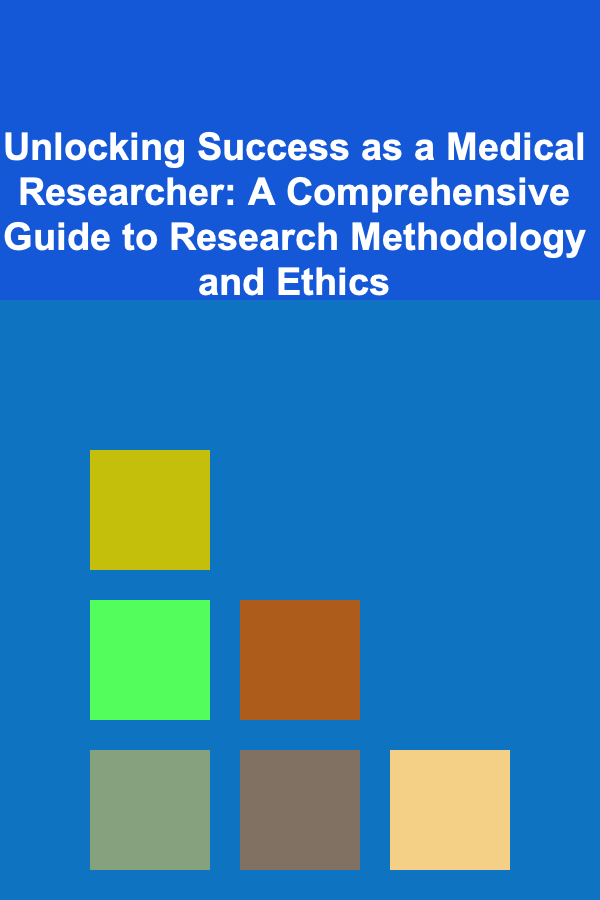
Unlocking Success as a Medical Researcher: A Comprehensive Guide to Research Methodology and Ethics
ebook include PDF & Audio bundle (Micro Guide)
$12.99$11.99
Limited Time Offer! Order within the next:

Medical research is at the heart of scientific innovation and improvement in healthcare. As a medical researcher, you have the potential to shape the future of medicine, develop new treatments, and contribute to improving health outcomes across the globe. However, succeeding in medical research requires more than just technical expertise; it demands a thorough understanding of research methodologies, a commitment to ethical standards, and the ability to navigate the complexities of data analysis and publication.
This comprehensive guide aims to provide actionable insights into the key components of medical research, focusing on research methodologies, best practices, and the ethical framework that governs research in the medical field. Whether you are just starting your career in medical research or looking to deepen your understanding of research processes, this guide will serve as a valuable resource.
Understanding Research Methodology
The methodology is the backbone of any research project. It provides the systematic approach necessary to answer the research question effectively and accurately. Medical research can take several forms, each with its unique methodology.
Types of Medical Research
-
Basic Research: Basic research focuses on understanding fundamental biological processes without immediate clinical application. This type of research typically involves laboratory experiments, cell cultures, animal models, or genetic studies. The findings can provide insights into disease mechanisms, which could later translate into clinical applications.
-
Clinical Research: Clinical research involves studies with human participants and focuses on evaluating the effectiveness of treatments, diagnostic tools, and healthcare interventions. It often takes the form of randomized controlled trials (RCTs), cohort studies, and case-control studies. These studies help in testing hypotheses in real-world settings.
-
Translational Research: Translational research bridges the gap between basic science and clinical application. The goal is to translate discoveries made in the lab into potential therapies for patients. Translational research involves the development and testing of new drugs, medical devices, or treatment protocols.
-
Epidemiological Research: Epidemiological studies examine the patterns, causes, and effects of health conditions within populations. These studies can be observational (e.g., cohort, cross-sectional, case-control studies) or experimental. They are critical in understanding public health issues and informing policy decisions.
Key Components of Research Methodology
- Research Design: This is the blueprint of the research. It outlines how data will be collected, analyzed, and interpreted. The choice of research design depends on the research question, the type of data available, and the desired outcomes. Common designs in medical research include cross-sectional studies, longitudinal studies, and experimental designs like RCTs.
- Sampling and Population Selection: The validity of research findings heavily depends on how well the sample represents the broader population. In clinical trials, random sampling methods ensure that every participant has an equal chance of being selected, reducing bias. In observational studies, careful selection criteria are needed to ensure that the study sample is reflective of the population under investigation.
- Data Collection Methods: Medical researchers often rely on a variety of tools for data collection, such as surveys, interviews, laboratory tests, medical records, and biometric measurements. It's crucial to use validated instruments and ensure the accuracy of data collection to avoid errors that could skew results.
- Statistical Analysis: Once data is collected, statistical methods are used to test hypotheses, identify trends, and make conclusions. The choice of statistical tests depends on the nature of the data (e.g., continuous or categorical) and the research question. Familiarity with software such as SPSS, R, or Python for statistical analysis is essential.
Ethical Considerations in Medical Research
Ethical integrity is a cornerstone of medical research. The pursuit of knowledge must always be balanced by a commitment to protecting participants' rights, ensuring the safety and well-being of all involved, and maintaining transparency in reporting.
Key Ethical Principles
-
Informed Consent: Participants in medical research must be fully informed about the nature of the study, including potential risks, benefits, and their rights. This process of informed consent is a fundamental ethical requirement. It ensures that participants voluntarily agree to participate in research with a clear understanding of what is involved.
-
Beneficence and Non-Maleficence: These principles call for researchers to maximize the potential benefits of the research while minimizing harm. Researchers must design studies in a way that minimizes risks to participants and ensures that the potential health benefits outweigh the risks.
-
Confidentiality and Privacy: The confidentiality of participants' personal and medical information must be protected at all times. This is particularly important in clinical and epidemiological research, where sensitive data is often collected. Researchers must ensure that all data is anonymized or de-identified, where possible, and securely stored.
-
Integrity and Transparency: Researchers must avoid any form of scientific misconduct, including data manipulation, falsification, and plagiarism. The research process should be transparent, with findings shared honestly, regardless of whether they align with the researcher's hypothesis or expectations. Transparent reporting also involves sharing methodologies, datasets, and conflicts of interest.
-
Ethical Review: Before any clinical or biomedical research can commence, it must undergo review by an Institutional Review Board (IRB) or ethics committee. These committees assess the risks and benefits of research proposals and ensure that studies meet ethical standards.
Special Considerations in Medical Research
- Vulnerable Populations: Certain groups, such as children, the elderly, pregnant women, or individuals with cognitive impairments, may require additional protections when involved in research. Special consent procedures and additional safeguards must be implemented to protect these populations.
- Placebo Use in Clinical Trials: The use of placebos in clinical trials raises ethical concerns, particularly in the context of potentially denying participants access to effective treatments. Researchers must ensure that the use of placebos is justified and that participants are not exposed to undue harm.
- Clinical Trial Registration and Reporting : Researchers are ethically obliged to register clinical trials with public databases such as ClinicalTrials.gov and adhere to guidelines for reporting results. This ensures transparency, accountability, and allows other researchers to avoid duplicating studies.
Navigating the Research Process
Achieving success in medical research requires careful planning and execution. Below are key steps in navigating the research process effectively:
1. Formulating the Research Question
The foundation of any successful research project lies in a well-defined research question. A good research question is clear, focused, and researchable. It should address a gap in existing knowledge, be specific enough to be manageable, and be broad enough to contribute to the field.
Example: "What is the effect of drug X on patients with chronic condition Y compared to a placebo?"
2. Literature Review
A thorough review of existing literature helps to define the research question more clearly, identify gaps in knowledge, and establish a theoretical framework. It is crucial to stay current with the latest research by reading peer-reviewed journals, attending conferences, and collaborating with colleagues.
Actionable Tip: Use databases like PubMed, Google Scholar, and Cochrane Library to find high-quality articles and systematic reviews.
3. Study Design and Proposal
Once you have a research question, the next step is to design your study. This involves selecting the appropriate methodology, defining your sample size, and outlining your data collection and analysis methods. A well-structured research proposal is necessary for securing funding and obtaining ethical approval.
4. Data Collection
This step involves gathering data according to your research design. Ensure that your data collection methods are consistent and validated. Pilot testing the data collection process can help iron out any issues before full-scale implementation.
5. Data Analysis and Interpretation
After data collection, statistical analysis is used to test your hypotheses and interpret your findings. The type of statistical tests you use will depend on your research design and the nature of the data. Be prepared to analyze your data critically and report both positive and negative results.
Actionable Tip: Before conducting analysis, familiarize yourself with the tools and techniques for handling different types of data, whether it's quantitative or qualitative.
6. Publishing Your Findings
Once your research is complete, sharing your findings with the scientific community is essential. Write a well-organized manuscript, and submit it to peer-reviewed journals. Publication is a critical part of the research process, as it ensures that your findings are accessible to other researchers and clinicians.
Actionable Tip: Aim to publish in high-impact journals relevant to your field. This increases the visibility and credibility of your work.
Overcoming Common Challenges in Medical Research
Medical research is often complex and filled with challenges. Here are some common obstacles and strategies to overcome them:
- Funding: Securing funding for medical research can be competitive. Applying for grants, collaborating with established researchers, and participating in research consortia can increase your chances of obtaining funding.
- Participant Recruitment: In clinical trials, recruiting sufficient participants can be a challenge. To overcome this, create detailed recruitment strategies, including outreach through healthcare professionals, patient advocacy groups, and public awareness campaigns.
- Ethical Dilemmas: Researchers often face ethical dilemmas, such as balancing the risks and benefits of a study or dealing with the complexities of informed consent. Regularly consulting with an ethics committee or institutional review board can help guide decision-making in these situations.
Conclusion
Being a successful medical researcher involves a blend of rigorous methodology, ethical responsibility, and the ability to navigate complex challenges. By mastering research methodologies, adhering to ethical principles, and embracing continuous learning, you can make meaningful contributions to the advancement of medical science and healthcare. Keep refining your skills, stay curious, and remember that ethical integrity is the cornerstone of all successful research.
Reading More From Our Other Websites
- [Home Holiday Decoration 101] How to Light Up Your Home for the Holidays with String Lights
- [Organization Tip 101] How to Organize Digital Memories for a Virtual Time Capsule
- [Hiking with Kids Tip 101] Conquering the Cliff: Fun Ways to Ease Your Child's Fear of Heights on Hiking Trails
- [Home Security 101] How to Use Smart Floodlights for Enhanced Outdoor Security
- [Home Storage Solution 101] How to Organize Your Garage with Custom Storage Systems
- [Personal Care Tips 101] How to Mix Perfume with Other Fragrances for a Unique Scent
- [Tie-Dyeing Tip 101] Vibrant DIY: Mastering Tie-Dye with Everyday Food Coloring
- [Home Party Planning 101] How to Leverage Party Planning Companies for Innovative Ideas
- [Organization Tip 101] How to Reevaluate Your Workspace Organization Regularly
- [Home Staging 101] How to Differentiate Home Staging from Interior Design

Best Organization Tools for Studying and Exams
Read More
How to Leverage Your Translation Skills to Earn Extra Income
Read More
How to Save Money on Home Internet Security: Smart Solutions for Every Budget
Read More
How to Use a Whiteboard for Weekly Meal Planning
Read More
How To Secure Your Data on Public Wi-Fi
Read More
10 Tips for Optimizing Your Recovery with a Weightlifting To-Do List
Read MoreOther Products

Best Organization Tools for Studying and Exams
Read More
How to Leverage Your Translation Skills to Earn Extra Income
Read More
How to Save Money on Home Internet Security: Smart Solutions for Every Budget
Read More
How to Use a Whiteboard for Weekly Meal Planning
Read More
How To Secure Your Data on Public Wi-Fi
Read More